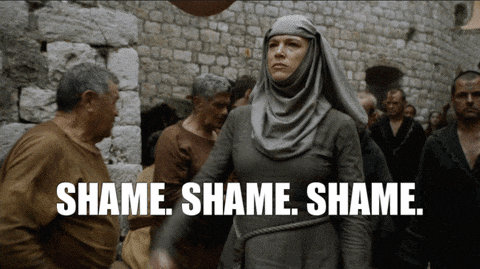What’s the most disturbing scene you’ve ever watched in a movie or television show?
Was it something real, like a documentary about the holocaust, or a serial killer?
Was it a scary scene in a horror film?
Or was it something that was psychologically freaky?
I remember watching the movie Deliverance in 1998, and afterwards, a friend of mine who told me to watch the film in the first place, asked, “What did you think?” I told him that it wasn’t as violent as he made it out to be, and “that scene,” which most everybody knows, really wasn’t that bad.
He said, “Man, we’ve become really desensitized to violence as a society.”
And this was 1998.
Maybe we’re just a little more accepting when somebody asks us to “squeal like a piggie” today? (If you haven’t seen the movie, you don’t get the reference)
In recent memory, the most disturbing scene I’ve watched was “Cercei’s Walk of Atonement” in Game of Thrones.
Many refer to this as the “SHAME!” scene, which is how I remember it in my mind’s eye.
What happened in the scene wasn’t so bad, comparatively. Cercei had to walk naked among the townspeople, and be cursed at, spat upon, and had food thrown at her. In the context of cinema history, it wasn’t so bad.
But what resonated with me was the breakdown of the character. To go from such a strong, powerful, confident woman to a completely beaten individual was just shocking. The whole time that Cercei was imprisoned, I assumed she would be fine. Maybe I underestimated the power that religion had thousands of years ago, but I couldn’t believe that the “High Sparrow” sat atop the power hierarchy, above all others.
In the end, however, I didn’t quite understand the shame.
Yes, Cercei was shamed for about three minutes during that walk of atonement, but afterwards, she likely showered, got cleaned up, had a hot meal and saw a doctor, and then she went back to being the Queen of the Seven Kingdoms and reigning supreme over everone and everything.
Is shame momentary? Or is it everlasting?
This week, I read the best article of the year thus far, whether real estate related or otherwise. In fact, I think this is the most poignant, through-provoking real estate article I’ve read in years.
The article, as you might assume by now, was about shame.
In fact, it was about a whole new concept, one which I had never heard about, and had actually never thought possible: the shame of owning a home?
What?
Come again?
Is this what we’re doing now?
Here’s the article in full. I’ve read it three times now, and I still can’t believe it…
“Homeowner Alert: Feeling Any Shame Yet?”
Peter Shawn Taylor
January 15th, 2019
You may have heard about the latest Swedish linguistic export — Flygskam, or flight shame.
It’s a word directed at people who fly and is intended to make them feel bad about their travel choice due to the environmental implications.
With this in mind, allow me to make a reckless prediction about the next crusading phrase meant to make people feel guilty about acting in their own best interests: Ensamfamiljhemskam.
This is my attempt at a Swedish word for ‘single family home ownership shame.’ (I used Google Translate; apologies to any Swedish readers if it actually means something rude.) It may not have reached common usage — but keep an eye on your dictionaries.
Last month, Evan Siddall, president of the Canada Mortgage and Housing Corp. (CMHC), gave a speech to a housing conference that might be considered an early indicator of approaching Ensamfamiljhemskam.
Before we get to what he said, let’s remind ourselves that the CMHC is a federal Crown corporation that facilitates Canadians buying homes through such things as mortgage insurance. It also operates as a sort of adjunct federal Department of Housing.
So what does Siddall think about home ownership? He seems to think it’s a very bad idea.
“Our ‘dream of home ownership’ is static and regressive,” he told his audience in Toronto. “We need to call out the glorification of home ownership for the regressive canard that it is.”
The often-combative Siddall said he wants to dismantle the dream of home ownership, and in particular put an end to Canadians’ aspirations of owning single-family homes — what he calls “the wrong sort of residential construction.” Rather than build 10 single-family homes on any particular plot of land, he said municipalities should favour “a 100 or 200 multi-unit development” of purpose-built rentals.
Given the significance of home ownership among Canadians — 67.8 per cent of Canadian households currently own their home — Siddall admits he has his work cut out for him. “The dream of a single-family home in the suburbs still burns strong for many,” he said, blaming this on a “real estate industry drunk on its excess.”
It has long been fashionable in urban planning circles to lament the supremacy of single family homes for a long list of environmental sins, including suburban sprawl. Siddall’s comments represent a dramatic escalation in this campaign by seeking to kill the notion of home ownership entirely through a combination of government policy and cultural disapproval.
From Siddall’s perspective, everyone should live in massively dense rental apartment complexes because that way we can fit more people into less space cheaply. (Stalinist Russia just popped into my head for some reason.) Single family homes are thus the selfish option because they prevent other denser options from occurring. Feeling shame yet?
With his provocative stance, Siddall has put himself rather far offside his federal bosses. It is his job, for example, to implement the Trudeau government’s new First Time Home Buyers Incentive program that has as its explicit goal helping young families buy houses.
And all Canadians continue to demonstrate a deep affection for home ownership. Despite plenty of talk about an affordability crisis among younger generations, a recent KPMG poll found 72 per cent of Canadians aged 23 to 38 want to own a home, even if that’s tougher today than it was for their parents.
“These comments reflect an elitist and dramatically out-of-touch sentiment,” says Tim Hudak, CEO of the Ontario Real Estate Association and a former Ontario Progressive Conservative leader, of Siddall’s speech. “It’s a shocking approach for someone whose position is to encourage people to have a place to call home.”
Hudak argues the solution to any affordability crisis lies in basic economics. If excess demand is the problem, increased supply will resolve it. His ‘all of the above’ list includes opening more land to new development, reducing red tape to allow for higher density projects and permitting innovations such as laneway homes and co-ownership — all policies recently backed by the Ford government.
And he offers a lengthy list of private and public benefits arising from home ownership, including forced retirement savings and stronger communities.
“Ontarians are on our side,” Hudak says, “The dream of home ownership is as strong as ever. And it provides an essential stability and strength to our social fabric.”
He’s right, of course. But that doesn’t mean we won’t be hearing more about Ensamfamiljhemskam from folks who simply don’t care about Canadians’ dreams.
Ummmm, wow.
Okay.
So I don’t want to try to connect any dots that really aren’t connected, but a quick Google search today shows this:
Was this speech his “Bulworth” moment, a la Warren Beatty? (another reference that some of you won’t get…)
I respect anybody who bucks the trend, thinks outside the box, doesn’t believe in conformity, and the like, but this speech that Mr. Siddall gave last month was really weird. Not just because he’s the head of the CMHC, er, was the head of the CMHC, but rather because it’s essentially the opposite of what most people believe.
The best line in the above article:
From Siddall’s perspective, everyone should live in massively dense rental apartment complexes because that way we can fit more people into less space cheaply. (Stalinist Russia just popped into my head for some reason.) Single family homes are thus the selfish option because they prevent other denser options from occurring. Feeling shame yet?
This guy may just be off his rocker.
And while I’m going to stop short of using my real estate resources to prove this as a fact, I would hazard a guess that Mr. Siddall does not live in an apartment building.
There are so many discussion points here that I almost don’t know where to start.
I suppose the first one would be just the nature of society today, which has made all good things bad, and all bad things good.
The so-called American Dream of getting married, having two kids, and owning a home with a white picket fence is now wrong for so many reasons, not the least of which seems to be that wanting to own a home is bad, and that, apparently, not living in dense, multi-unit dwellings is selfish.
But the reason why Mr. Siddall, in my opinion, is now crapping on the idea of home ownership has nothing to do with being young and woke. The reason seems to be, from what I was just told by a colleague, that it’s because he’s a jerk.
Mr. Siddall is “not well-liked,” as I’m told.
Mr. Siddall was previously an investment banker at Goldman Sachs Group and was brought in by Stephen Harper during the previous Conservative government’s tenure.
Detailed in a Financial Post article, MPC President, Paul Taylor, said it was “inappropriate” for the CMHC CEO to badger industry leaders in public. It’s been noted that Mr. Siddall frequently criticizes people on social media and in front of government panels.
The CEO of the Canadian Real Estate Association, Michael Bourque, said of Siddall, “I just don’t see how the rhetoric of pitting homeowners against renters helps anything.”
Ironically, the person I just spoke to told me that he “likes to shame people.”
There’s that word again, only in a different context…
It’s just quite odd for the CEO of CMHC to be shaming people for the dream of home ownership, is it not? And all the while, I am willing to bet that this former investment banker lives a very cushy lifestyle in a detached, freehold, maybe with a wine cellar, or a pool, who knows.
Is this a case of “Do as I say, don’t as I do?”
Does Mr. Siddall know better than the rest of us, and can he live a superior lifestyle while telling the rest of us not to strive for the same thing?
Is he ahead of his time? Can he see the glim future that we’re all headed for?
“Our dream of home ownership’ is static and regressive. We need to call out the glorification of home ownership for the regressive canard that it is.”
That’s quite the line!
But coming from the CEO of CMHC, honestly, who would believe this?
So on this otherwise happy Friday, I leave you with this: for those of you heading home tonight after a long day of work, there is only one word that should be on your mind as you put the key in the front door…


































A Grant
at 6:38 am
I’m going to focus on the following from the article:
“[Siddall wants to] put an end to Canadians’ aspirations of owning single-family homes — what he calls “the wrong sort of residential construction.”
I know I’m going to be pilloried for this, but – is he necessarily wrong? His focus is decrying detached single family homes as the gold standard Canadians ought to aspire to. An aspiration that has led to unchecked sprawl and the traffic, health and environmental impacts associated with it.
Rather than focusing on the extremes of the article, maybe some rethinking as to the choices we make when it comes to housing is in order.
I would argue that government has facilitated the current paradigm for to long. More policies that encourage denser development ought to be considered.
Not Harold
at 9:19 am
We don’t need policies to encourage denser development.
We need policies that stop prohibiting denser development and to stop the predatory behaviour of politicians.
The province should end Toronto’s Real Estate Transfer Tax, as well as all other fees that aren’t roads, sewers, schools, and parks. No councillor slush funds, no art fees. Province should also say that all zoning and bylaws that are contrary to official plans and or provincial law are null and void.
Bring back OMB with TEETH. If municipality opposes a project that complies with official plan, project gets double requested density and triple its costs as damages. Hold local politicians PERSONALLY liable for damages to projects that they illegitimately oppose. Require $500k bonds from intervenors (aka NIMBY groups and competing developers) who oppose any given development, possibly require a bond of 5-10% of the project’s budget to get intervenor status. Want to oppose a billion dollar project? Put up and be ready to lose $50 million!
FCK champagne socialists like Siddall, Trudeau, and Singh.
Kyle
at 9:24 pm
Here is an absolutely perfect example of what Not Harold is talking about. A struggling Entrepreneur getting put through the ringer at the behest of a meddling, vote-grubbing local politician, Nimby groups using the same old BS excuses and an antiquated by law that dates back to 1949 to try to prevent even the tiniest bit of progress.
https://trnto.com/211-coffee-house-faces-off-against-residents-group/
Ken Davenport
at 8:26 am
Unfortunately he’s not alone. The Economist’s cover story this week is all about how terrible home ownership is for society.
Chris
at 9:19 am
Have you read the Special Report? It is not all about why home ownership is terrible. Rather, it primarily lambasts government policy which have resulted in an inefficient market.
Mxyzptlk
at 12:44 pm
Of course he didn’t read the Special Report, he only looked at the (online?) magazine’s cover. Hence the faux outrage.
Appraiser
at 8:36 am
Apparently, Siddall’s contract won’t be renewed because he refuses to attend his anger management program.
This guy has issues.
Hey Evan, don’t let the door hit you…
Long Time Realtor
at 8:49 am
Yeah, good riddance. Some bears (esp. Rabidoux) are having a total bromance with this dude. His WWE style of communicating with the “real estate industry” was definitely growing tiresome. His bosses evidently don’t fancy continuing to ‘shame’ more than two-thirds of the electorate, any more than they have to.
Chris
at 9:14 am
Do you have a source you can share verifying this? Or is it just an unsubstantiated rumour you’re spreading? Because all I can seem to find is that Siddall has “ decided not to seek a renewal of my term as CEO”.
Long Time Realtor
at 10:36 am
It’s a joke, genius.
Chris
at 10:48 am
Ah, so as I figured, a fabrication.
Mxyzptlk
at 12:46 pm
Exactly. After you get called out, you claim it was a “joke.”
Appraiser
at 2:06 pm
Way too funny.
Chris
at 2:20 pm
Exactly right, Mxyzptlk. Appraiser defames Siddall on a public forum, then when called on it, quickly backtracks and claims “way too funny”. Pretty classless, but we all know that’s par for the course from him.
condodweller
at 11:41 am
to be 100% fair though the term “ decided not to seek a renewal of my term as CEO” doesn’t necessarily mean he left on his own accord.
This statement looks an awful lot like the statement “Regrettably, Mr. Johnson has left the company to pursue other career interests.” which is frequently issued when someone is fired in the corporate world.
Chris
at 12:44 pm
No, certainly doesn’t inherently mean he’s leaving of his own accord, hence why I asked if appraiser had any proof for his claim. None was forthcoming, so we can only assume it was a completely fabricated and libelous statement.
Jenn
at 9:06 am
David, I feel like you’ve gotten calmer with age. In years past this would have been written in a more aggressive tone and resulted in a Friday Rant.
David Fleming
at 9:56 am
@ Jenn
I didn’t feel this topic was worthy of a rant, but that’s because I don’t entirely disagree with the idea that “owning a house is for everybody.”
As I’ve noted many times over the last few years, I don’t think everybody should, or can, own a house. The idea is illogical, and I constantly lament the vote-buying, virtue-signalling politicians who delude the public into believing they “should” be able to own a home in Toronto on their low-income salary.
But the underlying theme in many of Evan Siddall’s quotes is what I despise about society today: that we’re starting to make good things, bad.
Owning a home is a great thing. Period.
And just as I lament the schools who stopped honouring students who get A+ marks, because it makes the kids who got D’s feel bad, I don’t think we need to continue to tear down those who achieve and do well, in this case, by shaming home-owners for their desire to “have.”
The Economist has two articles out this week about how awful home ownership is: “Housing is at the root of many of the rich world’s problems,” and “Home ownership is the West’s biggest economic-policy mistake.” All this does is stoke the fire for the kids on college campuses (most of whom have parents that pay for everything) who want to eliminate all air travel, are in favour of free speech – so long as it’s speech they like, want the government to guarantee income for life, want to buy things on Amazon and watch Netflix, but hate corporations, and on, and on, and on.
Kyle
at 10:00 am
So Jenn got a Friday Rant out of you after all. 🙂
Good job Jenn!
P.S. David, i don’t disagree with you.
Chris
at 10:31 am
“The Economist has two articles out this week about how awful home ownership is: “Housing is at the root of many of the rich world’s problems,” and “Home ownership is the West’s biggest economic-policy mistake.” ”
The Economist has a Leader article and an eight-article long Special Report, and as I said to Ken, the theme is not about “how awful home ownership is”. They are arguing primarily against government policies and NIMBYism which has resulted in inefficient markets.
In their own words: “This special report will argue that since the second world war, governments across the rich world have made three big mistakes. They have made it too difficult to build the accommodation that their populations require; they have created unwise economic incentives for households to funnel more money into the housing market; and they have failed to design a regulatory infrastructure to constrain housing bubbles.”
Batalha
at 12:51 pm
Chris, you’re simply too fact-based for this blog and its largely “shoot-from-the-hip” commenters. But by all means don’t leave!
condodweller
at 1:00 pm
I’m with you! Chris, we need you to provide us with clarity on a cloudy day :-).
Chris
at 2:21 pm
Thanks Bal and Condo, appreciate it!
Ken Davenport
at 12:24 pm
You have a point Chris. My statement was glib. Nevertheless I’m very concerned about where elites such as Mr. Siddall and the Economist’s editors are trying to drive society.
Home ownership has long been one of the best ways to build a nest egg. For most people, most of the time it far exceeds the perils of being a tenant.
With over five million vacant bedrooms in Ontario, it’s pretty obvious that our housing crisis is mostly an imbalance problem: some people have too much house and some far too little. Many smaller communities are also desperate for more residents even as Toronto goes through it’s current growth spurt.
While I agree that government policies are partly to blame for the current mess, especially policies which encourage excess consolidation in the megacity, demonizing home ownership is a really bad idea. Too many things divide us already. We don’t need this too.
Chris
at 1:02 pm
Personally, I don’t view Mr. Siddall’s comments as demonizing home ownership, but rather as combating commonly recited myths such as “renting is throwing your money away”, “you just need to get into the market”, “it’s always a good time to buy”, etc.
We’ve discussed renting compared to buying on this site before, and almost all agreed there is no universally correct path. For some, buying a home will be the best option. For others, renting is the better choice. It depends on each individual’s situation.
Similarly, The Economist’s Special Report is not anti home ownership, but does criticize government policies that stifle markets (poorly planned incentives and regulations), prevent building and development (zoning laws and caving to NIMBYism), and encourage over investment in real estate (excessively preferential tax treatment for real estate). They also weigh in to the rent versus buy debate, and come to a similar conclusion as above. I would encourage reading the Special Report in its entirety.
I don’t feel that Siddall, CMHC, or The Economist are saying never own a home. I think they’re trying to ensure healthier economies going forward, through better policy and more rational market participants.
Long Time Realtor
at 9:07 am
Home ownership may very well go the way of fossil fuels, eventually.
There may come a day when humans live in a utopian society without the concept of personal possessions (like Star Trek).
But we are not there yet.
Should we strive to be ?
condodweller
at 12:57 pm
@LTR as a fan of Star Trek I often think if it would be possible for us to live like that. Unfortunately with greed and jealousy being a driving force behind a lot of what people do I don’t see it happening. Wouldn’t it be great if we all could put our differences aside and work together for the greater good rather than individual success at the cost of other’s?
But that’s a rant for a different day 🙂
Mxyzptlk
at 3:13 pm
But if someone could invent a replicator…
condodweller
at 1:27 pm
I’m all for high density near public infrastructure. I believe there is a plan, however it’s a private plan, to build a bunch of mixed use towers on the Yorkdale grounds and surrounding area. When Bombardier moves from Downsview to Pierson there is a major plan to build mixed use buildings in place of the plant and runway. There is subway access and little low rise homes to worry about so they could build some serious height like downtown. They could probably build a good amount of rental units if they wanted to or at least incentivize builders to do so. I’m sure land could be found near the end of the new subway line and subway frequency can be increased to handle the extra population.
It would just take some will power and proper planning with foresight.
TOPlanner
at 2:07 pm
I think Siddall worded his point a bit aggressively, especially for a public servant, but I don’t disagree with the idea that detached houses should not be the be-all and end-all of housing options. It’s nit-picky, but I also think it was unwise of him to use the term “home ownership” rather than “house ownership”. A condo is a home.
I agree with A Grant and condodweller. It is more expensive and less efficient to build infrastructure for detached housing than it is for higher density forms of housing, so why not create a range of options?
Izzy Bedibida
at 5:00 pm
That’s the main problem. Not enough options or the available options are poorly designed/thought out/afterthought solutions or marketed under the name of “affordability”.
Case in point are stacked condo town homes that my gr 9 students laugh at when I do the introduction to architecture project, condo units way to small for a long term family living.
The industry marketing that one can’t have a family in anything less than 3000 sq ft is another issue, and developers lining their pockets with this myth.
cyber
at 11:44 pm
Agreed. Home is not the same thing as a detached house with garage(s), more bedrooms than family members, TV room/formal sitting room in addition to a living room etc. On average, only Americans and Australians in the world have more square footage per family.
‘Old stock’ Canadians are just struggling with facing the reality as it comes crashing against their expectations, which include wanting to ‘feel’ at least as well off as their parents who could easily afford a single family home on often in a single earner household. But the continued economic growth in Canada, and especially in the GTA, has been fueled by sheer immigration growth, which has seen GTA roughly double in population in a matter of decades. So, on a relative basis, Pickering is today’s ‘affordable suburb equivalent’ of previous generation’s East York. Toronto is a vastly different city today, and immigrants – just like New Yorkers – already know a bank teller simply cannot own a detached house in the downtown core in a globally attractive metropolitan region, and adjust their expectations accordingly (accepting either living further out and dealing with long commutes, or living closer to amenities and dealing with much smaller living quarters).
Obviously the supply issue is a huge contributor… It is quite insane that only 5% of the city land area is zoned for higher density residential/mixed use, while the ‘yellow belt’ takes up 75%, with the ‘missing middle’ (lack of) options available to younger and less affluent residents.
Gord
at 9:37 pm
Question for the crowd: if zoning regulations were changed to permit higher density in “yellow-belt” areas of Toronto (e.g. more multi-family residential buildings in existing single-family detached areas) – what would that mean for real estate values? It seems to me that large lots in neighbourhoods close to transit would see big jumps in value, as they would become even more appealing to developers. But city-wide, perhaps real estate prices would eventually decline, as more and more housing supply comes online (even if it is just rentals that are being built).
Marmota
at 8:51 am
There are many arguments in favor of more dense housing. I think we all agree they could be put forward without the need for “shaming”. However, it is not an uncommon way to bring a point across.
What I find most interesting is two fold:
1) Higher density housing would make sense in large cities within the Golden horse shoe and Vancouver, but may not necessarily make sense in less dense cities. It’s not a one size fits all.
2) Government policies often collide with one another and one hand often ends up doing just the opposite of the other: first time home buyers incentives VS land transfer taxes and street tests.
I find it’s really hard as a politician or a high profile bureaucrat to be able to reach out to anyone without a contradiction within yourself or other parts of government.
Another example that comes to mind when it comes to virtue signaling and environmental impact: the biggest carbon impact we can have is not having children yet we encourage having children through resp, tax breaks, subsidized childcare, you name it…
How do we balance the fact the we would want the most number of people possible to have (if not own) a home, with the fact that not all will even be able to have the 2500 Sq feet suburban freehold with the white picket fence?
Do I think it’s wrong to say that’s not what you should strive for? VS shame to those who have attained it, yes. But we all agree in this blog, that we seem to have a way to communicate that surely roughs up a lot of feathers. Form in politics often Matters more than substance, and this guy just chose a particular one to bring his point across. The fact that we’re discussing it means that he did his job… Some would argue there’s no such thing as bad publicity.
Appraiser
at 11:14 am
There is no doubt that increased “gentle intensification” within the yellow belt is but one arrow in the quiver toward attaining greater population density and eventually better affordability. There are many others, but they must all be utilized, and quickly, in order to combat the existing housing shortage in the T.O.
Kyle
at 11:25 am
Gord i agree with you. Owners of SFD homes in the yellow belt will gain, as their lot values increase with a new higher and better use that isn’t currently available to them. And affordability improves across the board since that lot can now be used to house many families and not just one family at 0.60 lot coverage.
On a smaller scale you can see this playing out, as homes that qualify for laneway housing (which are actually very few due to the 45m rule and the requirement to have a clear 1m separation between homes) will start to increase in value, meanwhile affordability for the homeowner that builds the laneway house improves with the ability to rent it out, and affordability for a renter trying to get into that lowrise neighbourhood also improves as there will be another rental unit available.
Ken Davenport
at 12:03 pm
Hyper density has it’s place, but it doesn’t belong everywhere. Take Innisfil. As per the below link the town has a stunning plan to build a new community of about 150,000 people within a 2 km zone surrounding it’s new GO station.
It’s a very long term project, but at 75,000 people/sq. km it’s built out density will be nearly triple that of Manhattan (25,846 as per Wikipedia) or four times that of Hong Kong (17,311).
Why does this make sense to anyone?
https://urbantoronto.ca/news/2019/11/city-future-could-propel-town-innisfil-orbit
Kyle
at 11:44 am
I don’t see the Innisfil project ever happening. It is like the opposite of what we’re seeing in Toronto. Innisfil seems very receptive and supportive to growth, but i don’t see the demand to live there. Meanwhile Toronto has demand out the wazoo, and all the City’s planning department wants to do is get in the way of change. They’re basically a department of professional frustraters and blockers.
Anyone who has ever tried to get a building permit can tell you why this City has a supply issue. Even simple as-of-right applications going through the City’s FastTrack take 3-4 months to be issued. If you want a minor variance add another 3-4 month on top of that. I can only imagine how long a medium to large project looking for consent to sever or rezoning takes. From one side of their mouth they talk about how they want to see more missing middle and pat themselves on the back for allowing laneway houses. But from the other side of their mouth they’re stonewalling and blocking anyone who actually tries to build those things.
Unless there is wholesale change of that department, i don’t see the Yellow Belt ever being at risk for any kind of major changes.